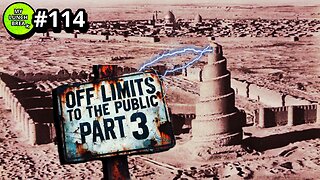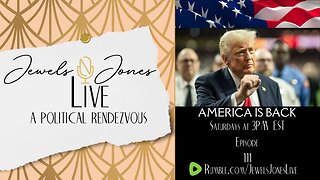Premium Only Content

First Contact: No Plan Survives
R&R IN PANDEMIC?
During a two-year public health crisis, during which period schools decided to close their doors, without hundreds of students rising in protest, probably lacking the sense of urgency found in existentially imperative issues, like preference in personal pronouns, and being able to pee wherever you want, reading scores hit 30-year lows, and mathematics scores dipped below where they were when the nation began tracking this basic education metric.
Is reading important in a public health crisis?
The WHO report in China in February 2020, appeared to suggest it was, noting that, after only a month, schools in China, specifically the Huanan Province, the only region affected by the draconian lockdowns, were beginning to reopen, providing an advantage vis a vis nations that decided to close schools for two years, and expressly stating that fully educating the public would be of the greatest benefit in prevention and mitigation, but, if you never read that report, you wouldn't know that, and the concept of replicability of results, one of the two R&Rs that are the basis of the scientific method, would impair your ability to gain a complete picture of a global phenomenon. All things being equal, a disease should, by results and outcomes, look generally the same in science reports, and if you assume that COVID-19 acted like that, you didn't read the world reports.
And, while Bible sales were breaking records for articles of religious faith that found actual Bible reading dip to historic lows, the author of that robust study, completed after 1,800 teams of epidemiologists had examined 55,924 laboratory-confirmed cases in China--19 times more cases examined than had yet been reported in the entire U.S. by mid-March 2020, and their trace contacts, a process hailed by the CDC during the ebola crisis in Zaire as the key to disrupting the spread, that had been almost entirely blown off worldwide, had lamented in an interview in early March 2020, that nobody appeared to have read his 40-page report, which, in case you missed it, stated expressly: "it is not clear whether this correlates with the presence of an infectious virus", and, empirically, based upon the vaccinations, we may fairly conclude, empirically, over 80% of Americans, who had heard "immunity", and were deafened to the sound of "defense" in Defense Production Act, used during the development of countermeasures products designed to address a significant threat to uniformed members of the active-duty military, and citizens residing abroad, according to the Emergency Use Authorization Declaration, on March 27, 2020, did not get that memo.
Is math important in a public health crisis? There were certainly a lot of percentages tossed around, which tends to involve some understanding of math, and if you were convinced about 90% efficacious, distinct from effective, "vaccines", but oblivious to a 1.1% case fatality rate, in the U.S, or a less than five percent secondary attack rate found in China, for purposes of reproducibility you had received low marks as a "global citizen", and also failed on the notion of replicability, often described as computational replicability, which is the global language with which scientists communicate in laissez-faire debates, without censorship, politics and ad hominems, to advance science.
And, by coincidence, a correlation that does not necessarily mean causation, at least the National Academies of Science had considered the terms "reproducibility" and "replicability" so important in 2015, when down at UNC-Chapel Hill they were teaming up with WIV to cultivate the first ever virus in vitro, which happened to be a SARS-like coronavirus, and obtaining a patent for a spike protein for their chimeric creation, which, by vocabulary definition would imply some animal genomes not usually found might have been included, explaining that aberrant from nature ophidian codon usage bias discussed in the report by Wei Ji, et al. in March 2020, that they dedicated over 250 pages to the topic, obviously of no great concern even to voters who voted for the science, and decided to be administered products about which the developers admit they did not yet understand the correlates of protection or even the mechanisms that could have made their product effective, in addition to whatever collateral processes were occurring in the body, or why we use the term "efficacious", and not "effective".
And, if you volunteered to have an experimental substance injected into your body about which the developers did not yet know the effects, face it, pal: you actually are a guinea pig, by the science.
-
 1:13:00
1:13:00
Patriots With Grit
15 hours agoWill Americans Rise Up? | Jeff Calhoun
46.2K13 -
 14:55
14:55
Exploring With Nug
15 hours ago $11.56 earnedWe Found Semi Truck Containers While Searching for Missing Man!
62K9 -
 27:57
27:57
MYLUNCHBREAK CHANNEL PAGE
23 hours agoOff Limits to the Public - Pt 3
142K69 -
 38:07
38:07
Michael Franzese
16 hours agoLeaving Organized Crime and Uncovering Mob in Politics: Tudor Dixon and Michael Franzese
111K15 -
 2:42:54
2:42:54
Jewels Jones Live ®
2 days agoAMERICA IS BACK | A Political Rendezvous - Ep. 111
86.9K50 -
 8:47:33
8:47:33
Due Dissidence
1 day agoLIVE: Workers Strike Back Conference ft. Chris Hedges, Jill Stein, Kshama Sawant, and More!
123K92 -
 8:36:37
8:36:37
Right Side Broadcasting Network
5 days agoLIVE REPLAY: CPAC 2025 Day Three with President Donald J. Trump - 2/22/25
471K104 -
 1:05:34
1:05:34
The Big Mig™
1 day agoConfirmed Kash Patel New FBI Director, Bring On The Pain |EP483
114K31 -
 53:59
53:59
Tactical Advisor
20 hours agoThe Vault Room Podcast 009 | Everyone Getting $5000?!
89.6K12 -
 2:04:44
2:04:44
TheAlecLaceShow
1 day agoLive at CPAC | Interviews with Dean Cain, Rep. Comer and more! | The Alec Lace Show
94K10